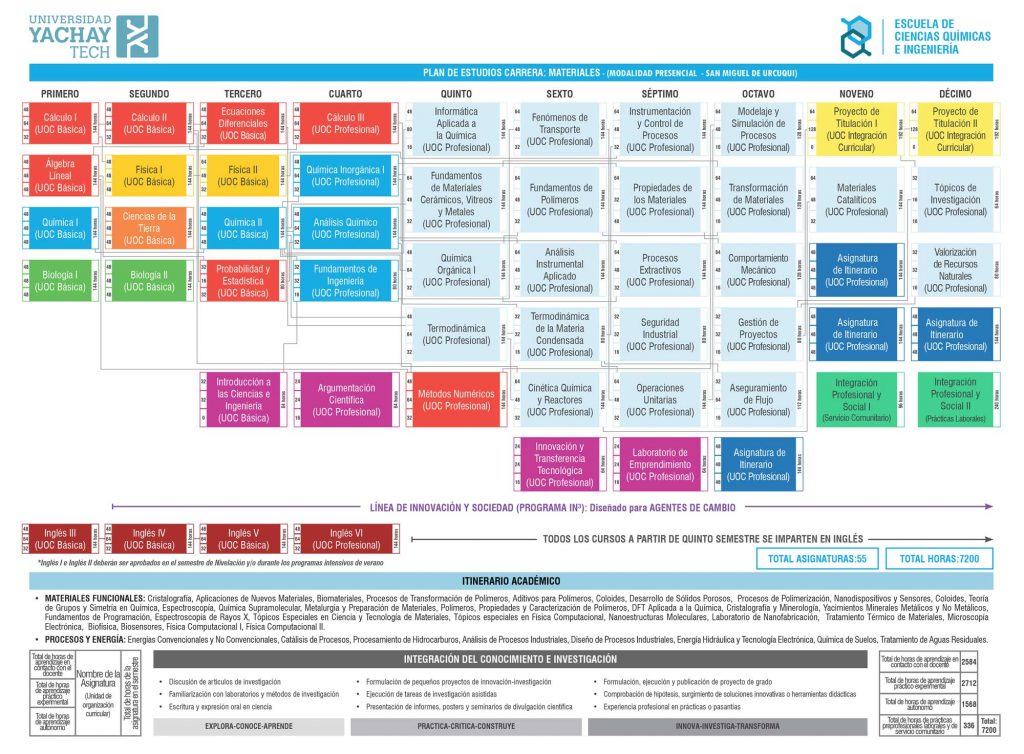
Materials Science and Engineering is based on the study of structure-property correlations that must be considered in the design, transformation and processing of materials to produce a system with a predetermined set of properties. At present, these materials are generated with an immediate purpose or “function”, that is, the fundamental objective of the study of new materials lies in their applicability but not in the mere fact of producing them.
Recent advances in the design and development of materials have impacted on different industrial areas and have motivated scientists and engineers to direct efforts to face the challenges that humanity faces related to the environmental impact of anthropogenic activities. Due to this, producing professionals with the competent tools and skills for the design, processing and treatment of ceramic, polymer, vitreous and metallic materials, gives the country the opportunity to consolidate its economic development. These professionals will be able to recognize and take advantage of the properties of raw materials available for the design of suitable materials and the development of alternative technological procedures that compete and even exceed those currently offered.
The proposal for the Materials major involves a synergistic training between teaching activities and research activities with a particular focus on the needs of society, framed within the lines suggested by the national development plan, promoting, at the same time, linking activities with society. The teaching activities will be framed in 51 courses, during which the concepts and theoretical foundations and experimental skills will be acquired to face the research activities in the subjects related to the Curricular Integration Unit. On the other hand, the bonding activities will be administered by the Social and Professional Integration courses. With this distribution of activities, the training of professionals who assume a leadership role in the conception, design, implementation and operation of new products, processes and systems in business and social contexts is guaranteed.

The Materials major offers 2 Itineraries:
- Functional Materials
- Processes and Energy
The Materials major combines the study of the atomic structure of matter and its union for the formation of ceramic / polymer / metallic materials, the transformation processes experienced and the mechanical, thermal, optical, electrical and magnetic properties that they finally exhibit. This way, it is intended to address the necessary approaches for understanding the structure / processing / properties and inter-relationship of materials, which condition and define their potential applications. When the structure of matter is mentioned, the spatial ordering of its constituent atoms must be taken into account, identifying whether it is an amorphous or a crystalline structure, for which, for example, the associated spatial unit cells, packing geometry in metallic, ionic and covalent solids, the respective preparation techniques for these materials, and the importance of imperfections in them. On the other hand, to obtain useful or functional materials for particular purposes, it is necessary to subject the respective atomic / molecular structures to different processes, under certain experimental conditions that depend on the chemical nature of the structures and the final applications. The optimization of these processes is key for the functional and economic efficiency of the materials obtained, so the knowledge of the different industrial operations, the type of most convenient reactors, the thermodynamics involved and the evaluation of the chemical kinetics that gives information the speed with which chemical transformations take place. For these last points, the engineering approach that has been given to the curricular structure of the proposed Materials major is of vital importance. Finally, the use of the materials obtained will depend on the properties achieved after carrying out these processes and transformations.
The focus on a participatory academic training that the Materials major encourages and guarantees the graduate will acquire skills that will allow him/her to develop, direct, coordinate, control and evaluate studies and research projects related to the design and transformation of materials of industrial and technological interest and academic. The practical and experimental training that the Materials Engineer receives during his/her training allows him/her to know the basic strategies to be implemented in the development of said studies, as well as preparing him/her for their participation in inter and transdisciplinary teams responsible for the development, execution and evaluation of programs and projects of interest. His/her experience and knowledge will allow him/her to participate in arbitrations, expertise and technical advice to industries, companies or educational institutions regarding the design, processing and transformation of polymeric, ceramic and metal materials.
The Materials major offers training that links basic sciences and applied engineering, so that the Materials Engineer has the ability to develop and / or advise research projects that connect the information of the microscopic nature of the material of interest with some specific technological application, and even its adaptation to an industrial level. The knowledge of basic concepts of material structure, thermodynamics and chemical kinetics, connected with the understanding of the behavior of materials and of the different phenomena involved in the transport of mass and energy, allows the Materials Engineer to carry out design of engineering /industrial processes for the preparation and production of materials with specific applications, bearing in mind the economic, environmental and social implications.